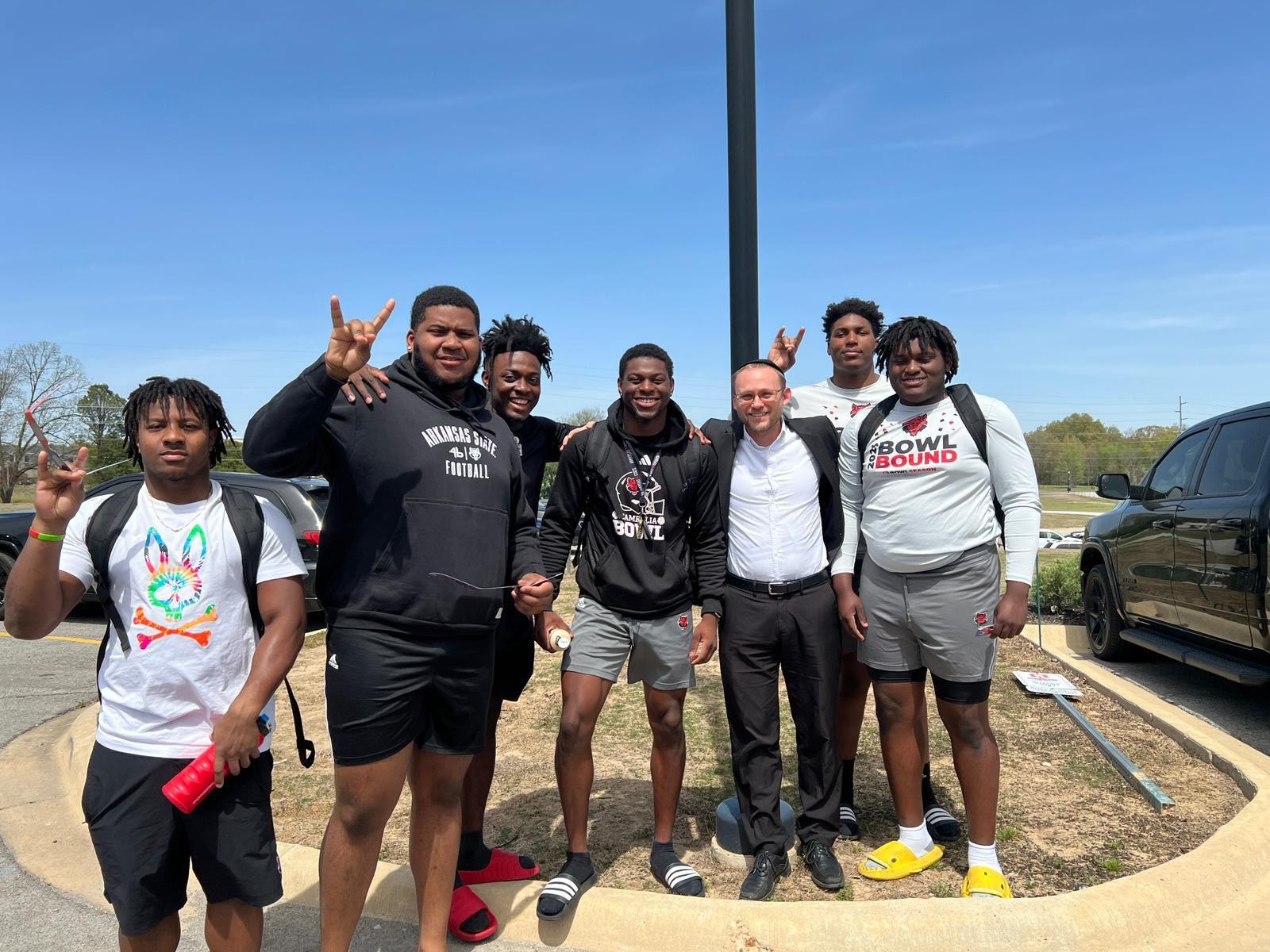Cooper Yeshiva High School for Boys


Kinyan Gemara: A Kollel Program
Jonah Siegel (’27)
"Is there a new Kosher restaurant in Memphis?" asked Eli Weisfogel. "Did we get the number one seed at Sarachek?" inquired Benny Freiden. The students of the CYHSB were confused because so many of their friends were gathered around a flier near the Beit Midrash. What caught everyone’s eye? The Memphis Kollel was offering a geshmak trip to New York! The only requirement was to learn a blatt of Gemara and pass a weekly test on what you learned. The trip
was inspiring and a reminder that hard work in learning Torah earns ample rewards.
Every week, students learned their piece of Gemara either at home or in a group at school. After five weekly tests with one of the Rabbis, came the final exam. This assessment determined if they would be able to go on the trip that they had been studying for, all that was left was to pick a time slot and get a good night's sleep. Following the exam results (every student passed!), students Continued on next page.
Volume 18, Issue 18 April 19, 2024 CYHSB Weekly 1 Volume 18, Issue 18
The Essence of Torah Study: Insights from the Chofetz Chaim Page 3 Radical Riddles Page 4
Model Beis Din: A Walk Through Page 5
Cooper Clicks Page 6
WEEKLY UPDATE:
Gold Kids: 6-2
Vandy's Vikings: 5-3
Somer's Marshmallows: 4-4
Wanan's Goats: 4-4
Beck's Decks: 1-7
Why School-Given Laptops Are Essential for Student Success Page 7 CYFL
1.
2.
3.
4.
5.
CYHSB WEEKLY
The high school boys meet with Rav Hershel Schachter. Photo by: Mr. Gibber
Continued fom previous page. ran home (obviously after mincha) and packed their bags for this lifechanging trip.
The trip started with a 6:00 a.m. nonstop flight to New York. Hearing Rabbi Gelb talk about the trip after davening got them all excited. He said, “This trip is going to be a geshmak experience”. Upon arrival, they traveled to the American Dream Mall and enjoyed the delicacies of kosher bacon and sausage at Dunkin' Donuts. Afterward, they went to an attraction called Activate. Everyone had the opportunity to stretch their legs and play several team-building games to achieve the highest score possible. Then, everyone enjoyed a Slurpee and cooled down after the exhausting but exhilarating activity.
And they had just gotten started. They headed to Yeshiva University to meet with the Rosh Yeshiva, Rabbi Hershel Schachter. He gave an uplifting dvar Torah about his background, which was truly a remarkable story. Next, they decided that they couldn’t leave Washington Heights without an authentic slice of New York pizza. After loading back up in the vans and singing some nigunim, the students arrived at the biggest kosher supermarket they had ever
seen. Immediately upon entering Gourmet Glatt, Rabbi Gelb excitedly announced, “This is not your Memphis Kroger. You don't need to scour every item for a hechsher. Everything is kosher!” The student were all blown away.
Uncertain of the next destination, they placed their trust in Rabbi Gelb and eventually arrived at the intended location: Rabbi Gelb’s sister's house. As they settled around the table, anticipation grew within them; it was evident that they were in for a treat. Their eyes widened at the array of dishes laid before them, and with the customary blessing recited, they eagerly began their feast. From sizzling hotdogs and juicy hamburgers to succulent chicken skewers, the options seemed endless. Maariv was particularly amazing as there was so much kavanah and feeling in the room.
The next day they woke up and headed to the Lutsk for some morning shiur. After that, they davened shacharit and had an amazing breakfast at the shul with a dvar Torah. They headed to the Lakewood Matzah Factory and got a tour of all the steps that go into making matzah. They then departed to the Beis Medrash Govoha for a tour of their buildings. Learning all about this
place was fascinating and had some of them questioning if they should go to yeshiva there.
Then they stopped by the Lakewood Hatzalah building to understand everything they do and the process of the medical team. What was most intriguing to them was how fast they could get to your house on such short notice.
Later the boys went to the Judaica Plaza where they all got the privilege to purchase a sefer. Subsequently, they drove to Elizabeth, New Jersey. On the car ride there they put on their special glasses and observed the solar eclipse. Once they arrived in Elizabeth, they had dinner at Avenue Grill and Sushi. The concluded the trip by heading back to the airport and boarding the plane back to Memphis.
During this trip, the highschoolers got to meet so many great people and visit so many special places. This wouldn't have been possible without the one and only Rabbi Gelb who planned and chaperoned this trip. Additional thanks to Rabbi Fromowitz for also helping plan this trip. There still aren’t enough kosher restaurants in Memphis, and we still aren’t the number one seed in Sarachek, but we had a meaningful trip, and we hope it will happen again in the future.



Volume 18, Issue 18 April 19, 2024 CYHSB Weekly 2
© CALVIN AND HOBBES Watterson. Reprinted with permission of ANDREWS MCMEEL SYNDICATION. All rights reserved.
The Essence of Torah Study: Insights from the Chofetz Chaim
Rafi Goldkin ('25)
In his sefer Toras Habayis, the Chofetz Chaim discusses why so many Jews have lost the fundamental principle that one should constantly be learning Torah. He explains that when the Torah was given to the Jews at Har Sinai, the Torah was given in two di ff erent forms: Torah Shebaal Peh (Oral Torah) and Torah Shebeksav ( Written Torah ) . Included in the Written Torah were Tanach, or Torah, Nevi'im, and Kesuvim while the Oral Torah consisted of Mishnayos and Talmud. Over time, the Oral Torah was passed down from father to son and rebbe ( teacher ) to talmud ( student ) . However, around the second century, Rebbi Yehuda Hanasi feared that the Oral Torah would be forgotten and compiled the halachos ( laws ) and svaros (opinions) into a work named the Mishnah. Later, Ravina and Rav Ashi compiled the Talmud, which included the Mishnayos and the discussions of the tannaim ( sages whose opinions were recorded in the Mishnah ) and amoraim ( sages whose opinions were recorded in the Gemara).


The Chofetz Chaim explains that before the Oral Torah was written down; it resided in every person's head. They constantly thought and talked about the Torah because they had to remember it. They were mekaim (upholding) the mitzvah of תרבדו םב, which we say every day in shema, and it means that we should
constantly be speaking words of Torah. After it was written down in sefarim (books), people no longer had to remember it, and they became accustomed to only thinking about the Torah when sitting in front of a sefer. This, the Chofetz Chaim says, is a huge problem and is the reason why so many Jews have given up learning around the clock. From this arises a basic question: why is studying Torah so fundamental?
I have seen a few possible answers, which I would like to elaborate on. Berachos (61B) describes a conversation between Rabbi Akiva and Pappos ben Yehuda. After the destruction of the Second Beis Hamikdash, the Romans continued to oppress the
Jews and banned Torah study. Rabbi Akiva decided to continue to teach the Torah publicly to other Jews while willingly risking his life. Pappos ben Yehuda approached Rabbi Akiva and questioned his decision, asking, “Aren’t you afraid of the Romans who could kill you?” Rabbi Akiva responded with a mashal (parable) There was once a fox walking along the bank of a river when he saw fish fleeing from place to place down the river. The fox asked: “What are you fleeing from?” The fish responded to him: “We are swimming from the humans who are setting nets to capture us.” The fox thought about this for a second and offered a solution. “How would you like to leave the water and join me on land? Then the nets can’t catch you.” The fish shouted back: “You are a fool! If we are afraid in a habitat that gives us life, all the more so, we will be afraid in a habitat that causes our deaths.”
The Chofetz Chaim expounds on this mashal, saying that when you take a fish out of water, it will flop around for a few minutes with the little water remaining on it. Only once the water covering the fish runs out will the fish finally die. It seems that what water is to fish, the Torah is to the Jewish nation. Without Torah, we could survive for a while, holding on to our mitzvos (commandments) and the little machshavah (thought) that Continued on next page.
Volume 18, Issue 18 April 19, 2024 CYHSB Weekly 3
The Chofetz Chaim. Source: pinterest.com
Continued fom previous page. remained in our heads. We would “flop around” until the Torah ceased to exist completely. A Jew without the Torah will surely stop keeping mitzvos. In Maseches (tractate) Shabbos (127A), the chachamim (sages) write that the Torah outweighs all the other mitzvos. The Ramchal writes in the first chapter of Messilas Yesharim that the way to develop a deeper closeness with Hashem is through performing the mitzvos in this world. Although this is a vast subject, the line from Shabbos describes how to achieve closeness with Hashem through studying the Torah. While some people view Torah as a chiuv (obligation) and chas vashalom a burden, others view it as an opportunity to connect to Hashem on a deeper level. Many rebbeim throughout history have been recorded as accepting upon themselves a certain practice to appreciate their learning more. Before reading a psak halachah (final decision on a halachah) or a svarah while learning, they would say “Amar Hakadosh Baruch Hu” or “Says, Hashem.” This custom made each
one realize that the Torah they were learning was Hashem’s opinion on how we should live. It is not just a random book of halachos and discussions; rather, it is the way Hashem thinks, ceveyachol (if possible), and the way He thinks is the best way to act.
In Bava Kama (30A), Rabbi Yehuda states that a Jew who wants to be pious should learn Seder Nezikin (a section of the Talmud dealing with damages to other people's items). This statement seems to be a chidush (novelty); however, once you appreciate the Torah and its purpose, the answer becomes clear. Suppose we learn Seder Nezikin and become aware of other people's property and therefore cause ourselves not to damage other people's stuff. In that case, the Torah we have learned has fulfilled two initiatives: studying Torah and refining our midos (characteristics). This ikar (essential) of Torah learning is also reflected on Shabbos Hagadol this week (the Shabbos before Pesach) On Shabbos Hagadol, we have a minhag for the Rav to give a drasha (dvar Torah) on the halachos of
Pesach and other related topics. We see how important Torah study is to our midos and practicality, and how we must apply the Torah we learn to our daily lives.
In Maseches Kiddushin (40B), there is a machlokes between Rabbi Tarfon and Rabbi Akiva, which is greater: learning or acting. Rabbi Tarfon says that action is greater, while Rabbi Akiva maintains that learning is better. The elders agreed with Rabbi Akiva and said learning is better because it leads to action. Many mefarshim ask if action is the end goal. It seems greater, so why not skip the learning step altogether? Aaron Dorfman answers that the learning step is much more essential because it guides us through the action step. It would be impossible to act without learning before it. This is why learning is so much greater. Without the ability to learn the halachos and mitzvos of the Torah, we would not be able to perform the most basic actions in this world. This Shabbos Hagadol, let us take the Torah we learn and apply it to our lives.


Volume 18, Issue 18 April 19, 2024
What five-letter English word can be pronounced the same even with four of its letters removed? First one to email Amit.Zalman@mhafyos.org gets a shout out on next weeks issue!
Radical Riddles
Model Beis Din: A Walk Through
Amit Zalman ('26)
In the halls of the school, a team of six dedicated minds, led by the guidance of Rabbi Gersten and chaperoned by Rabbi Grunwald was finally prepared. For months, The school's team of six; Amit Zalman, Yitzy Ryp, Avigdor Zweihorn, Ezra Davidovics, Avi Becker, and Jojo Ardestani worked diligently for the annual Model Beis Din competition.
Earlier this year, Lander's College presented the school with a case to dissect and debate. This case revolved around a young man who, once subjected to bullying, resorted to lacing his sandwich with poison in a bid to retaliate against his aggressor. The job of the team was to defend or prosecute this man in the eyes of Halacha . In preparation, the team would meet up at school and thoroughly go through sources and stories from the Gemara and commentaries that would either justify or disprove the student’s drastic decision to poison his bully. Fortunately, the team found this case very interesting and worth learning about, as Avi Becker describes it: "This sandwich dilemma prompted extensive research across various sources, and I was intrigued by the insights offered by certain Rabbis on the matter."
were very hungry, so the team left their luggage at their host’s house, split into groups, and went to find food. Since they had landed in New York early, they decided to go to the Queen Center Mall to spend the extra time.
Shortly after the mall, the team
lot of friends. Most of them were so tired from the flight that they couldn’t stay for the whole dinner and decided to go to sleep, which turned out to be a very wise choice for all of them.
The next morning, the nerves of the impending competition set in, and after lunch, they decided to do one big review in preparation for the next day’s debate. As Freshman Avigdor Zweihorn says “I had some doubts at first. I thought we were going to lose when I saw our opponents.” They all met on the second floor, and one by one, each of them went through their stances and various sources that they were assigned to learn.



The flight to the competition took off on Friday morning, and anticipation soared as the group was excited to see their hard work pay off. Once they reached LaGuardia airport, most of them
preparing for Shabbos. That night, they went to Lander’s College for the first time, and it was interesting for all of them to see a Jewish college incorporating both secular and Torah studies. Later, they had dinner with the other Model Beis Din teams, and a great part of them took this as a chance to hang out with kids and meet a
Opening ceremonies at Landers explained to them what they should expect and the order of things. Soon enough, their first match came with FYHS, (arguing against the use of the poison). Most of the team thought they performed well. Afterward, there was a question with Rabbi Jonathan Sacks to test their knowledge. They had their second match with Rambam School, which would have the team arguing for the man utilizing the position, it turned out to be a tough match.
After a long day, award ceremonies came, and unfortunately, our school didn’t make the podium, but at least all of them had a fun experience at Lander’s College and are ready to return for next year's competition.
Volume 18, Issue 18 April 19, 2024 CYHSB Weekly 5
The team gets ready for a final practice session. Source: Rabbi Grunwald
Cooper Clicks







Volume 18, Issue 18 April 19, 2024
Weekly
CYHSB
Top Right: Rrom left to right: Jonah Siegel, Raanan Vanderwalde, and Ilan Lennon at a tennis match. Middle: The tennis team warms up before the match. Bottom Left: Students perform bikur cholim and visit Rabbi Males. Bottom Right: Rabbi Safier poses with the Arkansas State University football team.
Photos By: JJ Stein and Jack Kampf
Why School-Given Laptops Are Essential for Student Success
Yitzy Ryp (’25)
The school is beginning a process of transferring the high school to a school-mandated laptop system.
Although this process has already been effect in the middle school, this year's ninth grade received a computer as well. These computers are an upgraded model, however, we must consider whether requiring the student body to use school-ordained laptops is truly necessary.
Consider the issue of affordability. Only some people can gather the funds for a schoolappropriate personal laptop, and by incorporating school resources, the students are granted the same tools as afforded to every student. Distractions form the main deterrent for students using personal laptops. We've all been there: in a work-environment intending to work on our schoolwork, but having full access to the Internet at our fingertips tempted us to play a game or watch a video. However, with school-provided laptops, the school can block access to what we can view and waste time on. Although some would say, “Why must we implement schoolmandated computers, couldn't we just restrict distracting sites over the wifi?” We should understand such restrictions are attempted over Wi-fi, but they are easy to bypass with as little as switching to a specific browser or alternative website domains.
This idea revolves around creating an environment where we can focus and maximize our time in class. With proper monitoring and filtering, the school can ensure that students use their laptops for
educational purposes, enhancing the overall learning experience. Some may say that this excessive limitation is too restrictive and impedes students' creativity. However, Students can achieve larger accomplishments when they have fewer distractions, and creativity is higher under these rules. Furthermore, should a teacher face difficulties with students requiring to use a blocked website, the school can edit the system to grant access to these previously blocked learning sources.
Wait, but why do we even need laptops? With distractions and monetary inequality impeding the system, why not just get rid of the technology entirely? Let's think about our future. We exist in a digital world that is everexpanding. By providing us with laptops now, the school is not just adapting us to this digital world but also giving us the required experience to thrive in it. We're developing skills that will serve us well in college, our careers, and our whole life. These laptops are preparing us to thrive in a society that is increasingly driven by technology.
There are other benefits to consider regarding the endless possibilities of having access to technology. From interactive lessons to creative projects, school-provided laptops open up a new world of learning experiences. Whether it's collaborating on a Google Docs presentation or conducting research for a history project, these laptops empower us to explore and engage with our education in once unimaginable ways. These computers have apps


Source: CNBC.com
and programs to help us succeed academically. This potential for personal growth and academic success inspires us, the audience, to strive for excellence and feel optimistic about the future.
Now, you might be thinking, "What about privacy concerns?"
It's a reasonable question because, with school-provided laptops, the school has the ability to track everything that is done on the device. However, schools have strict policies and measures to protect students' privacy and ensure their data is handled responsibly. While it's true that no system is perfect, school are committed to lowering potential risks and creating a safe and secure learning environment. The school also launched educational programs for students to learn about safe online practices. This reassurance about schools' commitment to privacy and data security should make you feel confident and secure.
School-provided laptops are not just devices but tools for empowerment and opportunity. Let's embrace them, make the most of our chance, and show the world what we can achieve when given the right tools to succeed.
Volume 18, Issue 18 April 19, 2024 CYHSB Weekly 7
To sponsor an issue and lend support to the next installment of your favorite Jewish newspaper, please reach out to Nadav.Lowell@mhafyos.org
Shabbat Shalom!
CYHSB Weekly Staff
Co-Editors in Chief
Nadav Lowell | Nadav.Lowell@mhafyos.org
Raanan Vanderwalde | Raanan.Vanderwalde@mhafyos.org
Head of Torah Affairs
Rafi Goldkin | Rafael.Goldkin@mhafyos.org
Layout Editors
Amit Zalman | Amit.Zalman@mhafyos.org
Yitzy Ryp | Yitzy.Ryp@mhafyos.org
News Editors
Jojo Ardestani | Jonathan.Ardestani@mhafyos.org
Akiva Levine | Akiva.Levine@mhafyos.org
Ilan Lowell | Ilan.Lowell@mhafyos.org
Photography and Social Media Directors
J.J. Stein | Jacob.Stein@mhafyos.org
Jack Kampf | Jack.Kampf@mhafyos.org
CYHSB Weekly Staff
Davi Baum | David.Baum@mhafyos.org
Benny Freiden | Benjamin.Freiden@mhafyos.org
Ilan Lennon | Ilan.Lennon@mhafyos.org
Jonah Siegel | Jonah.Siegel@mhafyos.org
Omer Zalman | Omer.Zalman@mhafyos.org
Avigdor Zweihorn | Avigdor.Zweihorn@mhafyos.org
--------------------------------------------------------------------------
Editor-in-Chief-Emeritus
Ezra Davidovics | Ezra.Davidovics@mhafyos.org
Head of Torah Affairs Emeritus
Avi Becker | Avi.Becker@mhafyos.org
--------------------------------------------------------------------------
Administrative Advisors
Mrs. Ashley Brown
Rabbi Dov Rossman
Message from the Editor:
With so much excitement in the CYHSB, it's nice to know Pesach is almost here. As our students return from their various New York trips and get into their routines of studying for the upcoming exams, they are all ready for the much-needed Pesach break. However, as always, we have the chance to gain insights from the minds of the students. This week you can learn about recently debated controversies in school policy as well as learning the importance of Torah in our daily lives. Over the next two weeks, we must take the insights from our students and enlighten our Pesach, making meaning of every second of the break.
-Raanan Vanderwalde and Nadav Lowell, Co-Editors in Chief
Volume 18, Issue 18 April 19, 2024 CYHSB Weekly 8





















